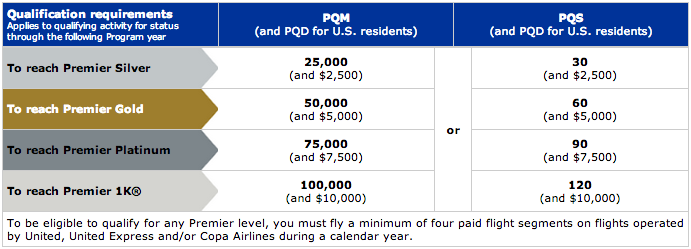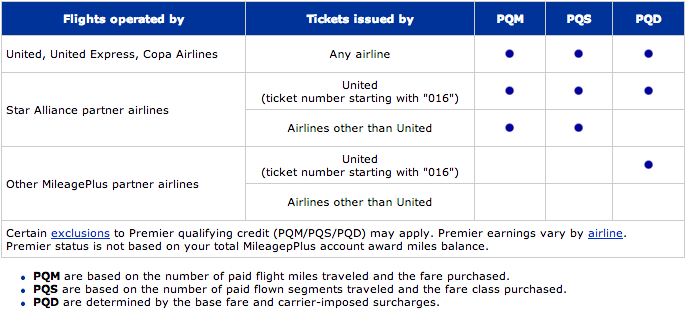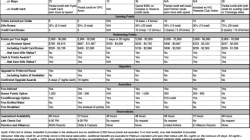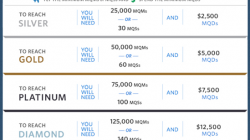Now that we’re in 2014, United Airlines has slightly updated its website to begin tracking Premier Qualifying Dollars (PQDs) — a new requirement for elite status. Similar changes have also been made to the United mobile app. I’ve written about PQDs before at the time of the program change and during a temporary glitch this fall when anyone could track their PQD progress for 2013. Today I’ll share more about how it will work in practice so you can plan for 2014.
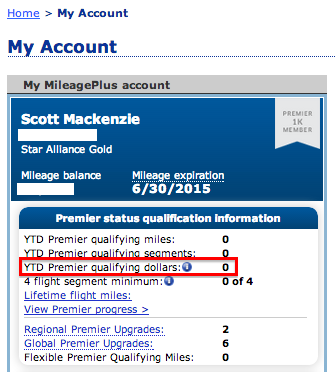
What’s Changing for MileagePlus Premier Status
None of the other qualification requirements are changing. You still need to earn the same number of Premier Qualifying Miles (PQMs) or Premier Qualifying Segments (PQSs) for each particular elite tier. You still need to fly four segments operated by United, United Express, or Copa Airlines. But in addition to those requirements, you also have to spend a certain amount of money, which are tracked as PQDs.
Just as each elite tier requires an additional 25,000 PQMs or 30 PQSs than the tier before it, so does it now also require $2,500 additional PQDs. The lowest elite tier is Premier Silver, which requires $2,500 PQDs, while the highest elite tier is Premier 1K and requires $10,000 PQDs.
How to Earn Premier Qualifying Dollars
PQDs are not quite as simple as tracking PQMs. If you book all your tickets through United.com or with a United agent you are probably okay. But if you make a habit of booking travel through other booking channels, you might run into an issue.
All flights operated by United, United Express, or Copa Airlines will earn PQDs, regardless of which airline actually issues the ticket. You’re pretty safe if it says “UNITED” in big letters on the side as you board.
For all other airlines that United partners with, whether they are Star Alliance partners or other MileagePlus partners (like Hawaiian Airlines), you will only earn PQDs if the ticket is issued by United. The ticket number should start with 016…
All this is different from earning PQMs in the past, where it was as simple as changing the frequent flyer number on the ticket. Now you have to make a decision in advance when you purchase the ticket (although you can still change the FF# to a different program at a later time).
Calculating Premier Qualifying Dollars
It’s pretty easy to calculate PQMs. A tool like GCMap.com can tell you how far you’ll fly. United has a simple table for applying fare class multipliers. Figuring out partner elite credit is challenging, yes, but it’s just another multiplier. About the only rule I have to remember is that “direct” flights that involve a connection but have the same flight number will earn fewer miles as if it was non-stop.
Like PQMs, the PQDs will be earned by the passenger who travels — regardless of who purchased the ticket — and are awarded only after travel is complete. But determining the number of PQDs each ticket earns requires breaking down the fare construction. You can do this by performing your preliminary search on ITA Matrix or looking at the passenger receipt.
PQDs are earned only for the base fare and carrier-imposed surcharges, including fuel surcharges. Economy Plus upcharges are also eligible. But government-imposed taxes and fees are not eligible. On domestic itineraries this is but a few dollars and not worth worrying about, but do pay attention during international travel when they can add up to $100 or more.
Waiving the PQD Requirement
There are only three ways to receive an exemption from the PQD requirement. Note that only the first of these (the address rule) may be used to receive an exemption from the PQD requirement for Premier 1K status. The credit card rules may only be used to receive an exemption for Premier Silver, Gold, or Platinum status.
- Live outside the United States, or use a military or diplomatic address (APO, DPO, or FPO).
- Spend $25,000 or more in net purchases on any United co-branded credit card issued by Chase. Cards no longer offered to new cardholders are still eligible.
- Hold a United MileagePlus Presidential Plus Card, one of several that are no longer offered to new cardholders.
You can check your online account summary to see whether you’ve completed the $25,000 spend requirement to receive a PQD waiver.
Summary
This post is only meant to explain the Premier Qualifying Dollar requirements. United offers many other rules that explain Premier Qualifying Miles and Segments on their website. But if you haven’t been tripped up before I wouldn’t worry about them as much.
I also want to remind you that if you miss any one requirement, you will only earn the elite status entitled by the requirements you do meet. For example, if you earn $10,000 PQDs but earn only 25,000 PQMs, you will only get Premier Silver status. And if you earn 100,000 PQMs but only $7,500 PQDs, you will only get Premier Platinum status.
On a positive note, now that the PQDs have been implemented, you can look forward to an update to my elite status comparison tables coming next week.

